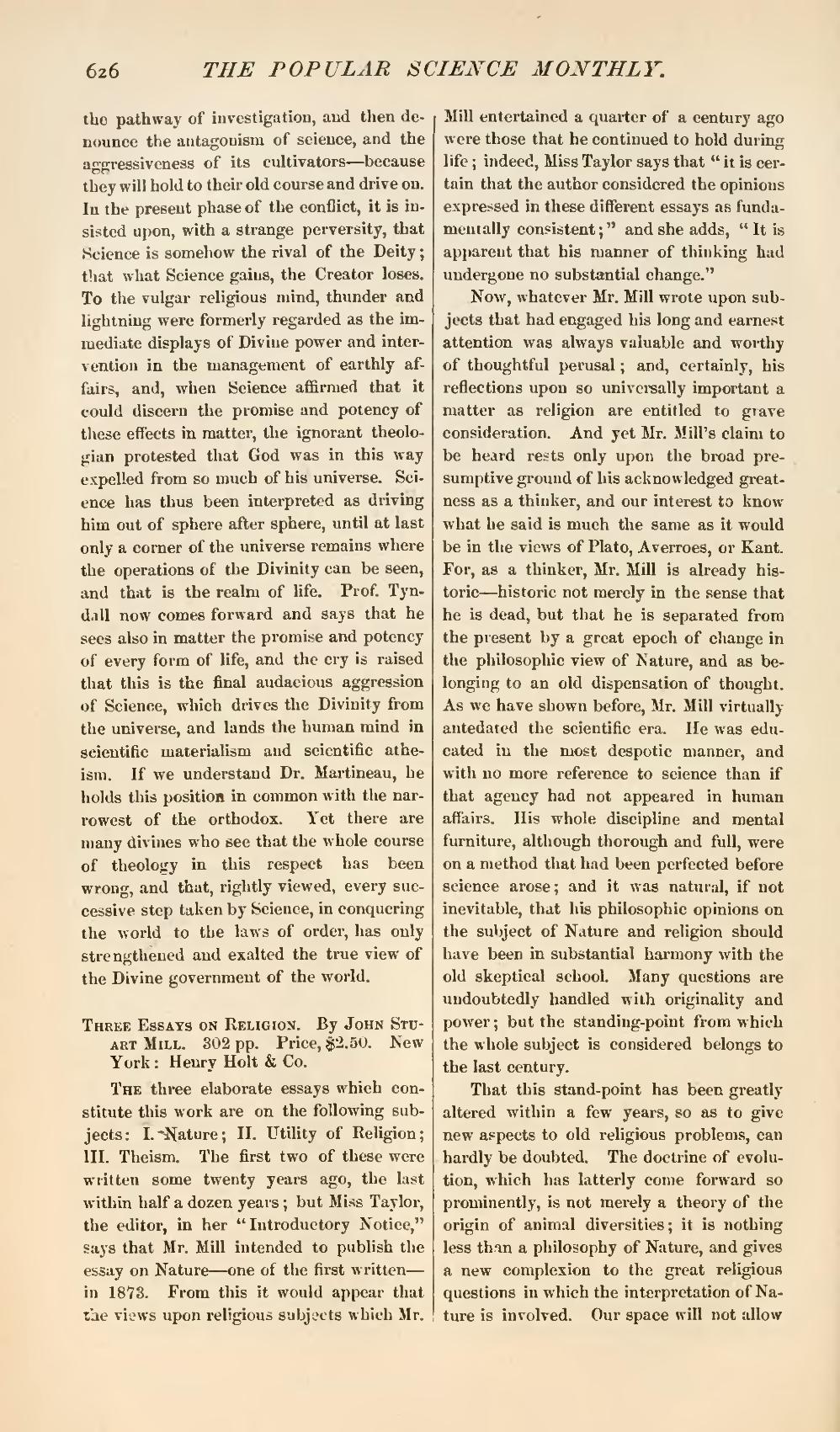the pathway of investigation, and then denounce the antagonism of science, and the aggressiveness of its cultivators—because they will hold to their old course and drive on. In the present phase of the conflict, it is insisted upon, with a strange perversity, that Science is somehow the rival of the Deity; that what Science gains, the Creator loses. To the vulgar religious mind, thunder and lightning were formerly regarded as the immediate displays of Divine power and intervention in the management of earthly affairs, and, when Science affirmed that it could discern the promise and potency of these effects in matter, the ignorant theologian protested that God was in this way expelled from so much of his universe. Science has thus been interpreted as driving him out of sphere after sphere, until at last only a corner of the universe remains where the operations of the Divinity can be seen, and that is the realm of life. Prof. Tyndall now comes forward and says that he sees also in matter the promise and potency of every form of life, and the cry is raised that this is the final audacious aggression of Science, which drives the Divinity from the universe, and lands the human mind in scientific materialism and scientific atheism. If we understand Dr. Martineau, he holds this position in common with the narrowest of the orthodox. Yet there are many divines who see that the whole course of theology in this respect has been wrong, and that, rightly viewed, every successive step taken by Science, in conquering the world to the laws of order, has only strengthened and exalted the true view of the Divine government of the world.
Three Essays on Religion. By John Stuart Mill. 302 pp. Price, $2.50. New York: Henry Holt & Co.
The three elaborate essays which constitute this work are on the following subjects: I. Nature; II. Utility of Religion; III. Theism. The first two of these were written some twenty years ago, the last within half a dozen years; but Miss Taylor, the editor, in her "Introductory Notice," says that Mr. Mill intended to publish the essay on Nature—one of the first written—in 1873. From this it would appear that she views upon religious subjects which Mr. Mill entertained a quarter of a century ago were those that he continued to hold during life; indeed, Miss Taylor says that "it is certain that the author considered the opinions expressed in these different essays as fundamentally consistent;" and she adds, "It is apparent that his manner of thinking had undergone no substantial change."
Now, whatever Mr. Mill wrote upon subjects that had engaged his long and earnest attention was always valuable and worthy of thoughtful perusal; and, certainly, his reflections upon so universally important a matter as religion are entitled to grave consideration. And yet Mr. Mill's claim to be heard rests only upon the broad presumptive ground of his acknowledged greatness as a thinker, and our interest to know what he said is much the same as it would be in the views of Plato, Averroes, or Kant. For, as a thinker, Mr. Mill is already historic—historic not merely in the sense that he is dead, but that he is separated from the present by a great epoch of change in the philosophic view of Nature, and as belonging to an old dispensation of thought. As we have shown before, Mr. Mill virtually antedated the scientific era. He was educated in the most despotic manner, and with no more reference to science than if that agency had not appeared in human affairs. His whole discipline and mental furniture, although thorough and full, were on a method that had been perfected before science arose; and it was natural, if not inevitable, that his philosophic opinions on the subject of Nature and religion should have been in substantial harmony with the old skeptical school. Many questions are undoubtedly handled with originality and power; but the standing-point from which the whole subject is considered belongs to the last century.
That this stand-point has been greatly altered within a few years, so as to give new aspects to old religious problems, can hardly be doubted. The doctrine of evolution, which has latterly come forward so prominently, is not merely a theory of the origin of animal diversities; it is nothing less than a philosophy of Nature, and gives a new complexion to the great religious questions in which the interpretation of Nature is involved. Our space will not allow
